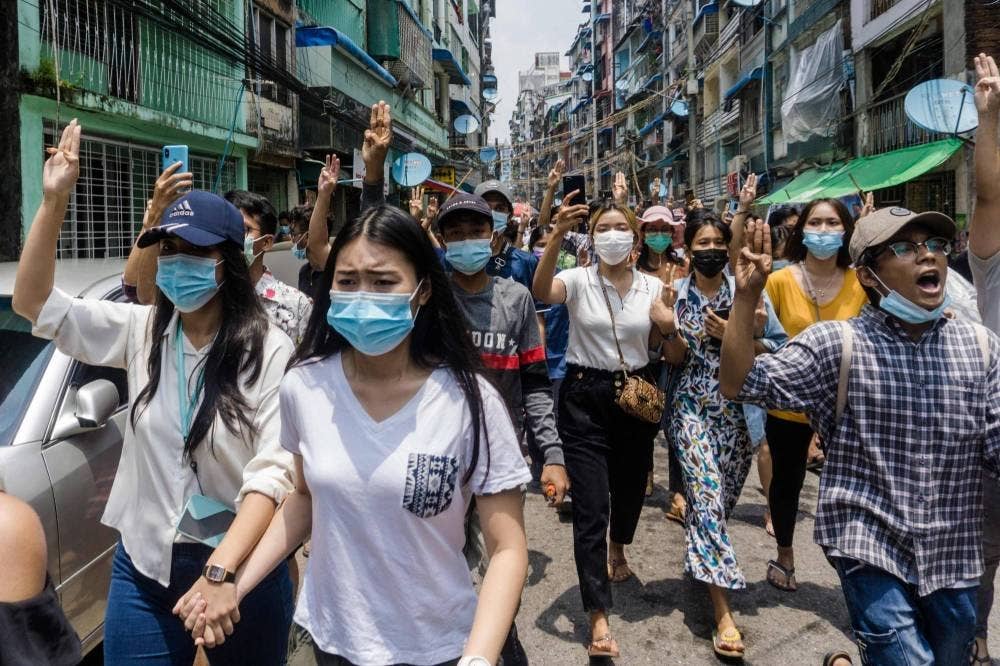A Dying Myanmar - Is Asean doing enough? Four policies for consideration
On Foreign Policy
Zokhri Idris01 Aug 2022 06:02pm

On July 23, four activists were executed by the Junta military alleged for “leading brutal and inhumane terror acts.” - AFP pic
Ever since Junta’s coup takes place in 2021, Asean is once more been put to a test.
Myanmar’s internal power struggle and its democratisation journey often implicate not only its surrounding countries but all Asean members.
The pressure for Asean is mounting when global superpowers US, Russia and China expect for Asean’s capabilities in mitigating the crisis and in restoring stability in Myanmar. If anyone could ask, what would be Asean greatest challenge in the post-pandemic era, it is Myanmar’s instability that shakes Asean’s centrality in the years to come.
On July 23, four activists were executed by the Junta military alleged for “leading brutal and inhumane terror acts.”
This is by far one of the most alarming events, since the in-operationalised Five Consensus Points.
The Five Consensus Points is by principle agreed by all stakeholders including Myanmar’s top general, Min Aung Hlaing during a special meeting in April 24, 2021.
The Agreement seeks all parties to immediately end all violence in the country, to establish dialogues with all, to appoint Asean special envoy to Myanmar, to allow Asean humanitarian assistance as well as to allow Asean’s special envoy to meet all parties. As we speak, none of these have been met.
I submit that Asean is not doing enough to handle the situation from worsening. To begin with, the regional organisation is fragmented upon framing the issue.
Thailand, Cambodia and the Philippines regard Myanmar’s catastrophe as internal affairs and are unlikely to channel their political drive to the situation. Singapore, Indonesia and Malaysia are particularly concerned on other hand and have shown proactive measures to counter the incidents.
Such view divergence is very much telling in predicting Asean’s response. There is no consensus understanding and concerted efforts from ASEAN member states when dealing with Myanmar’s deterioration.
Applying a non-interference policy as a norm in Asean, we are reaching almost a deadlock in the situation.
However, I would argue that this shall not be the justification for Asean member states to sit and idle on the status quo, and seeing more destruction happening day by day in Myanmar.
As of June 2022, the Armed Conflict Location and Event Data Project (AKLED) reports of 21,000 massacres in total since the coup takes place which includes more than 130 children. We believe the numbers are increasing from time to time.
This blockage urges for some policy responses for Asean’s consideration.
Asean’s conventional stance on non-interference must be reviewed and re-alligned with contemporary events. Not only in the case of Myanmar, Asean’s heightened securitisation have questioned the sustainability of non-interference in the long term.
While Asean is formed to create unity and prosperity among its member country basing on non-interference, securitisation has evolved rapidly since its early years of formation until current. In 1967, we did not face state-conducted violence, but Myanmar happens.
With the rising tensions in the South China Sea and unpredictable power transitioning order in the world, the conventional stance of non-interference would not sustain Asean.
Isolationism is not the answer and must not be the future practice in Asean. All stakeholders must be brought to negotiation. Asean should not follow the footsteps of Myanmar in isolating key players to the conflict.
Myanmar was isolated during the US-Asean Special Summit leading to a discussion of US and Asean member countries without allowing the Junta to explain for itself.
An interesting observation during the 2022 Shangri-La Dialogue suggests for one aspiration – stability in Myanmar. A stable Myanmar (regardless of its administration) is a key interest to the US, China and Asean countries. Therefore, in fostering our efforts towards stability, we must bring all stakeholders to negotiate. It will ensure Asean’s subsequent steps are aligned with the wishes of the people.
A stronger and more assertive Asean humanitarian intervention into Myanmar. The livelihood of Myanmar’s people is our utmost priority at the moment. Asean must not forsake people’s life when aligning sides throughout difficult times.
The Junta must be convinced the region is only seeing the livelihood of the people as a reason for assistance and Asean interference must not be colluded with political allegiance.
As a short-term measure, trust building between the Junta and Asean Secretariat must be re-built to allow humanitarian assistance to take place in Myanmar.
Scenario plotting for influx of refugees and communities’ displacement in Thailand, Laos, Cambodia and Bangladesh. Asean, including Malaysia has witnessed the repercussions of Myanmar’s violence when refugees flooded into neighbouring countries out of desperation.
We believe this will be the case, should Tatmadaw persistently persecutes the people of Myanmar.
As such, this calls for policy response of neighbouring countries in handling the arrival of refugees as well as existing refugees at camps.
At the 36th Asean Summit, the then Prime Minister Tan Sri Muhyiddin Yassin reversed Malaysia’s accommodating policies towards the Rohingyas. Malaysia portrays to be a global Muslim solidarity nation, at the same time had its stumbling blocks when it still fails to sign the 1951 Refugee Convention and the 1967 Protocols.
Myanmar’s issue is here to stay for a longer period of time, and a consistent regional response must be in place in handling refugees and community displacement.
Myanmar is a testing ground for Asean’s sustainability. It has put us into a juncture, comfortably adopting decades status-quo practices, or constructively innovate its regional policies and norms.
It is evident, that the non-interfering policy is restraining Asean to have a regional stance and subsequently concerted efforts in managing ongoing crises. At the same time, regional dynamics and global uncertainties have escalated security risks which caused small and developing countries to become more vulnerable.
Asean must adapt to these changes and adopt suitable mechanics in sustaining its regionalisation process and regionalism.
Zokhri Idris holds a Ph.D in International Relations from Korea University. He aspires to become a prominent scholar, a strategist, and an influencer of Modern Leadership and Diplomacy in the context of International Relations. His area of interest also includes China’s geo-political behaviourism as a current global shift.
Download Sinar Daily application.Click Here!














